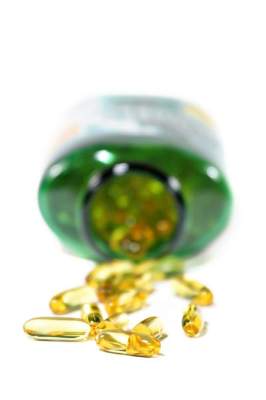User login
High-dose vitamin D did not improve outcomes in critically ill, vitamin D–deficient patients, compared with placebo, researchers reported in JAMA and at the annual congress of the European Society of Intensive Care Medicine.
Although the study was adequately powered, length of stay did not differ between the vitamin D and placebo groups, said Dr. Karin Amrein of the Medical University of Graz, Austria, and her associates. “In the overall cohort, hospital and 6-month mortality rates were numerically lower in the vitamin D3 group, but these differences were not significant,” the researchers said.
A subgroup of patients with severe vitamin D deficiency did have significantly lower hospital mortality when treated with vitamin D, compared with placebo, but the effect “should be considered hypothesis generating and requires further study,” the investigators concluded (JAMA 2014 Sept. 29 [doi:10.1001/jama.2014.13204]).
The randomized, double-blind, single-center trial enrolled 492 critically ill medical and surgical patients with serum vitamin D levels of 20 ng/mL or less. Patients received placebo or vitamin D3 at a loading dose of 540,000 IU, followed by a monthly maintenance dose of 90,000 IU for 5 months, the researchers said.
Length of hospital stay averaged 20.1 days for patients who received vitamin D and 19.3 days for the placebo group, the investigators reported.
Among patients who received vitamin D3, 28.3% died in the hospital, compared with 35.3% of the placebo group (hazard ratio, 0.81; 95% confidence interval, 0.58 to 1.11), they said. Six-month mortality was 35.0% for the vitamin D3 group, compared with 42.9% for the placebo group (HR, 0.78; 95% CI, 0.58-1.04), they said.
Among 200 patients with severe vitamin D deficiencies of 12 ng/mL or less, vitamin D3 treatment was linked to a 44% drop in risk of dying in the hospital, the researchers said (28.6% vs. 46.1% for placebo; HR, 0.56; 95% CI, 0.35 to 0.90; P = .04).But length of hospital stay and 6-month mortality rates were similar between the two groups, they reported.
Drug maker Fresenius Kabi provided study medication and a grant to support the research. The European Society for Clinical Nutrition and Metabolism and the Austrian National Bank also funded the study.
Dr Amrein reported and one coauthor reported receiving lecture fees from Fresenius Kabi. The authors reported no other relevant financial conflicts of interest.
High-dose vitamin D did not improve outcomes in critically ill, vitamin D–deficient patients, compared with placebo, researchers reported in JAMA and at the annual congress of the European Society of Intensive Care Medicine.
Although the study was adequately powered, length of stay did not differ between the vitamin D and placebo groups, said Dr. Karin Amrein of the Medical University of Graz, Austria, and her associates. “In the overall cohort, hospital and 6-month mortality rates were numerically lower in the vitamin D3 group, but these differences were not significant,” the researchers said.
A subgroup of patients with severe vitamin D deficiency did have significantly lower hospital mortality when treated with vitamin D, compared with placebo, but the effect “should be considered hypothesis generating and requires further study,” the investigators concluded (JAMA 2014 Sept. 29 [doi:10.1001/jama.2014.13204]).
The randomized, double-blind, single-center trial enrolled 492 critically ill medical and surgical patients with serum vitamin D levels of 20 ng/mL or less. Patients received placebo or vitamin D3 at a loading dose of 540,000 IU, followed by a monthly maintenance dose of 90,000 IU for 5 months, the researchers said.
Length of hospital stay averaged 20.1 days for patients who received vitamin D and 19.3 days for the placebo group, the investigators reported.
Among patients who received vitamin D3, 28.3% died in the hospital, compared with 35.3% of the placebo group (hazard ratio, 0.81; 95% confidence interval, 0.58 to 1.11), they said. Six-month mortality was 35.0% for the vitamin D3 group, compared with 42.9% for the placebo group (HR, 0.78; 95% CI, 0.58-1.04), they said.
Among 200 patients with severe vitamin D deficiencies of 12 ng/mL or less, vitamin D3 treatment was linked to a 44% drop in risk of dying in the hospital, the researchers said (28.6% vs. 46.1% for placebo; HR, 0.56; 95% CI, 0.35 to 0.90; P = .04).But length of hospital stay and 6-month mortality rates were similar between the two groups, they reported.
Drug maker Fresenius Kabi provided study medication and a grant to support the research. The European Society for Clinical Nutrition and Metabolism and the Austrian National Bank also funded the study.
Dr Amrein reported and one coauthor reported receiving lecture fees from Fresenius Kabi. The authors reported no other relevant financial conflicts of interest.
High-dose vitamin D did not improve outcomes in critically ill, vitamin D–deficient patients, compared with placebo, researchers reported in JAMA and at the annual congress of the European Society of Intensive Care Medicine.
Although the study was adequately powered, length of stay did not differ between the vitamin D and placebo groups, said Dr. Karin Amrein of the Medical University of Graz, Austria, and her associates. “In the overall cohort, hospital and 6-month mortality rates were numerically lower in the vitamin D3 group, but these differences were not significant,” the researchers said.
A subgroup of patients with severe vitamin D deficiency did have significantly lower hospital mortality when treated with vitamin D, compared with placebo, but the effect “should be considered hypothesis generating and requires further study,” the investigators concluded (JAMA 2014 Sept. 29 [doi:10.1001/jama.2014.13204]).
The randomized, double-blind, single-center trial enrolled 492 critically ill medical and surgical patients with serum vitamin D levels of 20 ng/mL or less. Patients received placebo or vitamin D3 at a loading dose of 540,000 IU, followed by a monthly maintenance dose of 90,000 IU for 5 months, the researchers said.
Length of hospital stay averaged 20.1 days for patients who received vitamin D and 19.3 days for the placebo group, the investigators reported.
Among patients who received vitamin D3, 28.3% died in the hospital, compared with 35.3% of the placebo group (hazard ratio, 0.81; 95% confidence interval, 0.58 to 1.11), they said. Six-month mortality was 35.0% for the vitamin D3 group, compared with 42.9% for the placebo group (HR, 0.78; 95% CI, 0.58-1.04), they said.
Among 200 patients with severe vitamin D deficiencies of 12 ng/mL or less, vitamin D3 treatment was linked to a 44% drop in risk of dying in the hospital, the researchers said (28.6% vs. 46.1% for placebo; HR, 0.56; 95% CI, 0.35 to 0.90; P = .04).But length of hospital stay and 6-month mortality rates were similar between the two groups, they reported.
Drug maker Fresenius Kabi provided study medication and a grant to support the research. The European Society for Clinical Nutrition and Metabolism and the Austrian National Bank also funded the study.
Dr Amrein reported and one coauthor reported receiving lecture fees from Fresenius Kabi. The authors reported no other relevant financial conflicts of interest.
Key clinical point: Vitamin D3 treatment did not reduce hospital length of stay or mortality in critically ill patients with vitamin D deficiency.
Major finding: Length of hospital stay averaged 20.1 days for patients who received vitamin D and 19.3 days for the placebo group (P = 0.98).
Data source: Randomized, double-blind, placebo-controlled, single-center trial of 492 critically ill medical and surgical patients with vitamin D deficiency of 20 ng per mL or less.
Disclosures: Drug maker Fresenius Kabi provided study medication and a grant to support the research. The European Society for Clinical Nutrition and Metabolism and the Austrian National Bank also funded the study. Dr Amrein reported and one coauthor reported receiving lecture fees from Fresenius Kabi. The authors reported no other relevant financial conflicts of interest.


